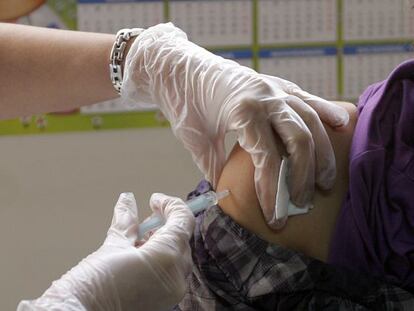Health Ministry blocks supply of chickenpox vaccine to pharmacies
Medication agency denies freeze but says 350,000 doses were "used incorrectly"

Parents who want to inoculate their children against chickenpox before the age of 12 will have trouble finding the vaccine at pharmacies, even if they are willing to pay out of their own pocket rather than go through the public health system.
The Health Ministry has blocked delivery of Varivax, the only vaccine that may be sold in pharmacies to prevent the infectious disease. Authorities are apparently doing so because they have detected an abuse in its intended use, as reported by three scientific societies - the Spanish Pediatrics Society, the Spanish Vacunology Association and the Spanish Society for Preventive Medicine, Public Health and Hygiene - who are warning of a stock shortage.
A spokesman for the Sanofi labs also confirmed that their product is no longer being delivered to pharmacies for retail sale.
Belén Crespo, director of the Spanish Agency for Medication and Health Products (AEMPS), which answers to the ministry, denied the freeze on Varivax, but admitted that certain steps are being taken after they detected an excess in private prescriptions "of around 350,000 doses" that have been "used in conditions for which it is not approved."
The vaccination calendar for chickenpox is not homogenous across Spain. As a rule, it is available free through the public health system for children over 12, the age established by a committee of medical experts. This criterion might become universal as of next year. But a few regions such as Navarre, Madrid, Ceuta and Melilla have been making it available much earlier: the first dose between 12 and 15 months of age, and the second one between two and three years.
Scientific societies recommend this early option, noting that 90 percent of chickenpox infections occur before the age of 12, and that 15 percent of cases come with side effects that could have been prevented.
That is why, in regions where the public health system makes parents wait until the age of 12 for a free vaccination, some parents ask their private pediatrician for a prescription and pay the 71.81 euros per dose to administer Varivax to their children. Private immunization rates are as high as 50 percent on average, says David Moreno, vaccine coordinator for the Spanish Pediatrics Society.
Thanks to private vaccination we've managed to notably reduce the infection rate for the chickenpox virus″
"Thanks to private vaccination we've managed to notably reduce the infection rate for the chickenpox virus," he says. "In the United States little kids have been immunized for the last 15 years - the first dose between 12 and 15 months and the second between four and six years of age - and the disease has nearly been eradicated."
In the regions that allow for free, early vaccination, there is no shortage of Varivax for private use; just in those with the 12-year age limit. There is one other vaccine made by GlaxoSmithKline, Varilrix, but it is only available in hospitals.
A Sanofi spokeswoman explained that in mid-July the laboratory received an official resolution from AEMPS blocking distribution of Varivax to the pharmacy network. "No motive was given," she says. "Until a little over a month ago it was business as usual. Under no circumstance is this decision related to safety issues or product efficiency; there are no production problems, either."
The ministry denies the existence of any official letter, and instead suggests that Sanofi told them they were short on supplies. AEMPS chief Crespo said the agency also took public health considerations into account. "It is unclear whether very young children may not in fact need new doses [later in life] for the treatment to be efficient, or whether there may be side effects, such as the possibility of developing herpes zoster in the future," she said. "This is a battle that's being waged by a company that works on the principle of economic interests. Chickenpox is a benign disease among young children; it's during the teenage years that it can get more complicated, that is why it is not necessary to administer the vaccine before the age of 12."
Moreno, of the Spanish Pediatrics Society, denies that they are submitting to industry pressure to sell more vaccines, an argument that is always present in any debate about the vaccination calendar. "We are guided by what's best for children," he says.
Tu suscripción se está usando en otro dispositivo
¿Quieres añadir otro usuario a tu suscripción?
Si continúas leyendo en este dispositivo, no se podrá leer en el otro.
FlechaTu suscripción se está usando en otro dispositivo y solo puedes acceder a EL PAÍS desde un dispositivo a la vez.
Si quieres compartir tu cuenta, cambia tu suscripción a la modalidad Premium, así podrás añadir otro usuario. Cada uno accederá con su propia cuenta de email, lo que os permitirá personalizar vuestra experiencia en EL PAÍS.
¿Tienes una suscripción de empresa? Accede aquí para contratar más cuentas.
En el caso de no saber quién está usando tu cuenta, te recomendamos cambiar tu contraseña aquí.
Si decides continuar compartiendo tu cuenta, este mensaje se mostrará en tu dispositivo y en el de la otra persona que está usando tu cuenta de forma indefinida, afectando a tu experiencia de lectura. Puedes consultar aquí los términos y condiciones de la suscripción digital.








































